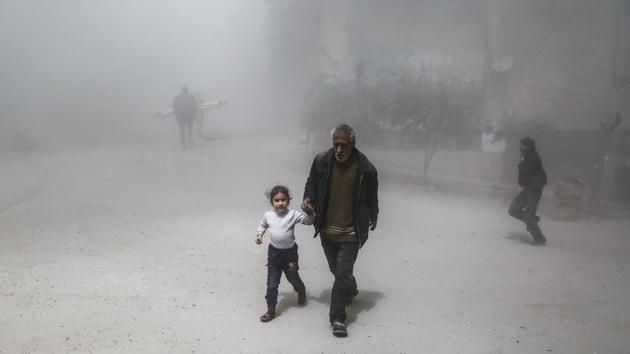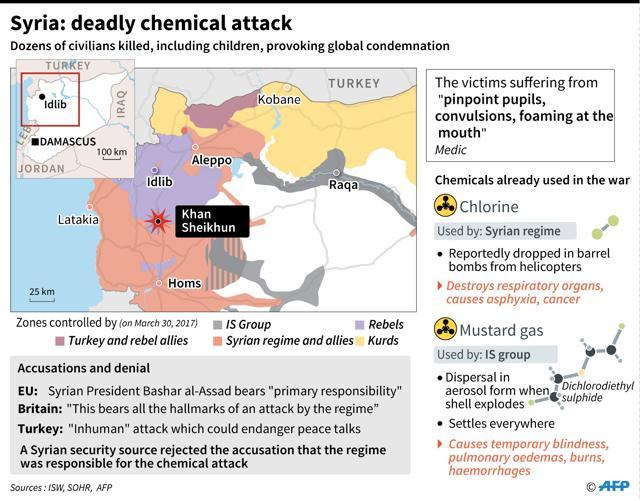2013 Sarin attack to UN intervention: History of chemical weapons used in Syria
Chemical weapons have killed hundreds of people since the start of Syria’s civil war, with the UN blaming three attacks on the Syrian government and a fourth on the Islamic State group.

Syrian rebels and opposition activists say pro-government forces have used chemical weapons and bombs containing chlorine on numerous occasions. They say a chemical weapons attack on a town in northern Syria on Tuesday killed dozens of people. The Syrian government has denied ever using such weapons.
Here is a timeline of events related to chemical weapons use in Syria.
August 20, 2012: Former US president Barack Obama says the use of chemical weapons would be a “red line” that would change his calculus on intervening in the civil war and have “enormous consequences”.
March 19, 2013: The Syrian government and opposition trade accusations over a gas attack that killed some 26 people, including more than a dozen government soldiers, in the town of Khan al-Assal in northern Syria. A UN investigation later finds that sarin nerve gas was used, but does not identify a culprit.
August 21, 2013: Hundreds of people suffocate to death in rebel-held suburbs of the Syrian capital, with many suffering from convulsions, pinpoint pupils, and foaming at the mouth. UN investigators visit the sites and determine that ground-to-ground missiles loaded with sarin were fired on civilian areas while residents slept. The US and others blame the Syrian government, the only party to the conflict known to have sarin gas.
August 31, 2013: Obama says he will go to Congress for authorisation to carry out punitive strikes against the Syrian government, but appears to lack the necessary support in the legislature.
September 27, 2013: The UN Security Council orders Syria to account for and destroy its chemical weapons stockpile, following a surprise agreement between Washington and Moscow, averting US strikes. The Security Council threatens to authorise the use of force in the event of non-compliance.
October 14, 2013: Syria becomes a signatory to the Chemical Weapons Convention, prohibiting it from producing, stockpiling, or using chemical weapons.

June 23, 2014: The Organization for the Prohibition of Chemical Weapons says it has removed the last of the Syrian government’s chemical weapons. Syrian opposition officials maintain that the government’s stocks were not fully accounted for, and that it retained supplies.
August 7, 2015: The UN Security Council authorizes the OPCW and UN investigators to probe reports of chemical weapons use in Syria, as reports circulate of repeated chlorine gas attacks by government forces against civilians in opposition-held areas. Chlorine gas, though not as toxic as nerve agents, can be classified as a chemical weapon depending on its use.
August 24, 2016: The joint OPCW-UN panel determines the Syrian government twice used helicopters to deploy chlorine gas against its opponents, in civilian areas in the northern Idlib province. A later report holds the government responsible for a third attack. The attacks occurred in 2014 and 2015. The panel also finds that the Islamic State group used mustard gas.
February 28, 2017: Russia, a stalwart ally of the Syrian government, and China veto a UN Security Council resolution authorising sanctions against the Syrian government for chemical weapons use.
April 4, 2017: At least 58 people are killed in what doctors say could be a nerve gas attack on the town of Khan Sheikhoun in the rebel-held Idlib province. Victims show signs of suffocation, convulsions, foaming at the mouth, and pupil constriction. Witnesses say the attack was carried out by either Russian or Syrian Sukhoi jets. Moscow and Damascus deny responsibility.



